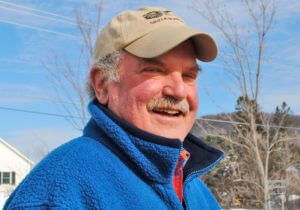Get the U.S. out of Vermont

On the 200th anniversary of Vermont joining the U.S., UVM professor of political science Frank Bryan traveled the state’s countryside and debated secession at seven town-hall meetings. All seven towns voted in favor of it.
Yeah, I can be myself here in this small town
And people let me be just what I want to be
Got nothing against a big town
Still hayseed enough to say
Look who’s in the big town
But my bed is in a small town . . .
~ “Small Town” – John Mellencamp
So, in my last OutTake I looked back over my three-quarters of a century of life at some of what I remembered as the worldly happenings that occurred in that time.
Well, now I want to peer into the future, try to foresee how we in Vermont might be living if this thing called the United States were no longer our political entity. Yeah, man, I’m talking secession, New England the beautiful, Trump Towers across the national border. We should not, however, need a wall to separate us—maybe a drainage ditch or not the “Great” but still the “Pretty Good” Lake Champlain would serve the purpose.
You may recall that one of our Charlotte neighbors, the late Thomas Naylor, proposed this idea 15 years ago in a written piece titled The Vermont Manifesto. Naylor, a retired economics professor from Duke University who had grown up in Mississippi in what he called a family of inveterate racists, suggested that an independent Republic of Vermont and any other interested New England states secede from the U.S. and establish itself as just that, a republic of its own, smaller but better than the empire that flows from sea to shining sea.
Vermont tested independence in the late 18th century when it removed itself from the British Empire but did not become part of the United States. Its constitution was the first in America to outlaw slavery. Ironically, a number of the secessionist opponents during the Obama years believed that secession was an ultra right-wing movement. They said Texas nationalists were an example of those who wanted to become part of the land of cotton along with a following of those who believed that southern confederacy was not a bad way to live—blond-haired and blue-eyed denizens of what it takes to make whatever entity we’re part of “great again.” Knowing that Thomas had been a southerner, they assumed he was conservative in his racial views.
However, in an article in the American Prospect six years ago, Christopher Ketchum quoted author and historian Morris Berman, who was optimistic about Vermonters reinventing the notion of secession. Berman said, “I’m a historian. I look at what’s possible. Reinventing secession would not be a mere political revolt, not simply a regional separation, but also, and probably more important, a revolt against the economy of empire, a move toward economic independence.”
“Capitalism is eating itself alive,” he says. But, “as the system unravels you have all these little flowering buds appear.” Viewing our state/nation as a “flowering bud” would likely appeal to a number of Vermonters.
Although in his recent book Fear (Simon and Schuster, 2018), Bob Woodward does not mention secession as a viable alternative to our current political climate, which he detests, he does focus heavily on our current sour economic climate that favors the top echelons and leaves the middle and lower classes struggling.
On the 200th anniversary of Vermont joining the U.S., UVM professor of political science Frank Bryan traveled the state’s countryside and debated secession at seven town-hall meetings. All seven towns voted in favor of it. Bryan noted that the only concern seemed to be defense. But, he said, being on the Canadian border, “Who the hell is gonna bother us?”
Naylor felt it was important to get beyond both ends of the political spectrum, left as well as right, who are “all about bigness and power—big government, big business. . . about owning, possessing, controlling and manipulating money, people, material wealth.”
Naylor was ahead of his time. But time may well have caught up with us. The T-shirt that says “U.S. Out of Vermont” holds meaning today. According to Ketcham, it does not promote revolution. It is more like divorce.
Author and environmentalist Bill McKibben says whether secession gains traction “depends to some degree on what happens with Trump—on whether he turns out to be normally bad or abnormally bad.”
That determination is now up to us. Build a bridge to Switzerland where we could learn about neutrality.

